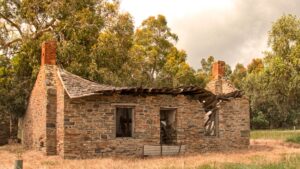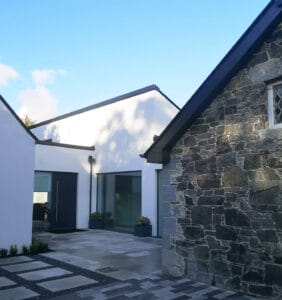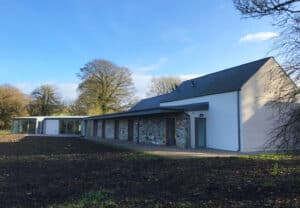Planning Permission Rural Ireland
Are you dreaming of building or making a home of your own in the Irish countryside? Getting planning permission can seem daunting, and it is becoming more challenging year on year. We can help to show you how to make your dream a reality. Let’s look at some of the criteria involved in creating a home involving a one-off house on a greenfield site.
The first step is to establish what type of person / applicant you are.
Are you:
- City / town born and bred?
- Rural born and bred or lived at least 15 years in a rural area?
- Involved in farming?
- Owner and operator of a horticultural/forestry/bloodstock business?

The bad news is that you are extremely unlikely to get planning permission for a new-build one-off house on a greenfield site in rural Ireland. The National Planning Framework 2040 requires Co. Councils to refuse planning permission to those without an economic or social need to live in a rural area. Be wary of consultants who advise otherwise, as you could spend a lot of money on a planning application without any chance of success.
Don’t despair, the good news is that there are alternative options. For instance, converting and extending derelict houses or old farm buildings can make for beautiful living spaces. Virtually no derelict dwelling is unsalvageable. Even fixing up old bungalows from the 1970’s can be fantastic as witnessed by Hugh Wallace’s “My Bungalow Bliss” RTE series. The main chance you might have for a new-build house would be on an edge-of-town serviced and zoned site.
Many people are looking at moving back into towns and villages and converting empty shops and the floors above into homes in search of a more sustainable way of living, close to schools and amenities. This is a key component of the Government’s ‘Housing for All’ scheme. There are now huge incentives for doing this with exemptions from planning permission and grants available of up to €70,000 (subject to T+C).
To find out more see additional criteria below or click the ‘Book and Appointment’ button on the bottom right and we can discuss your circumstances in more detail as the situation above varies between different Co. Councils.
Fixer Upper
Rural born and bred or lived at least 15 years in a rural area?
If you are a person who has resided in a rural area for a substantial period of your life (12-16 years) seeking to build your home on a family landholding, you are in with a good chance of getting planning permission for a one-off house. You will need to be building close to your family on land in family ownership. Where no land is available in your family ownership, a site within an appropriate distance of your family home (c. 5 Km) may be considered.
To find out more see additional criteria below or click the ‘Book and Appointment’ button on the bottom right and we can discuss your circumstances in more detail as the situation above varies between different Co. Councils.

This is the golden ticket, and justifiably so, as it is essential for farmers to be close to their farms. However, there are terms and conditions applying. The Co. Council could have restrictions on the minimum size of farm (c.15 ha / 40 acres) which may also have to be in the ownership of the applicant’s immediate family for a minimum e.g. seven years preceding the date of the application for planning permission. A farmer may be the son/daughter/
niece/ nephew of a farmer who it is intended will take over the operation of the family farm.
The farmer must be engaged in the farming activity on a daily basis, as their main employment. This must be demonstrated through the submission of documentary evidence such as Herd No. or Teagasc confirmations to include proof that the farming/agricultural activity forms a significant part of the applicant’s livelihood.
We always recommend that an analysis of existing buildings and structures on the farm is undertaken prior to commissioning any new building. Often, there are beautiful stables or outbuildings that can be refurbished to make great homes.
Sometimes, an inter-generational solution may be warranted where the older/retiring farmer builds a smaller more sustainable home and the younger farmer takes over the larger/existing farmhouse.
To find out more see additional criteria below or click the ‘Book and Appointment’ button on the bottom right and we can discuss your circumstances in more detail as the situation above varies between different Co. Councils.
Refurbished farmhouse (DCAE design)
Owner and operator of a horticultural/forestry/bloodstock business?
This situation is similar to being a farmer as in the scenario outlined above. An application may be considered on smaller sites ( less that 15 ha / 40 acres) where it can be proven that the owner and operator of a farming/horticultural/forestry/bloodstock/Animal husbandry business is engaged in that activity on a daily basis, as their main employment. This must be demonstrated through the submission of documentary evidence to include confirmation that the farming / agricultural activity forms a significant part of the applicant’s livelihood
To find out more see additional criteria below or click the ‘Book and Appointment’ button on the bottom right and we can discuss your circumstances in more detail as the situation above varies between different Co. Councils.

Additional Criteria:
Planning Legislation:
It’s one thing preparing beautiful drawings and house designs; it’s another making sure you comply with all relevant planning laws as well. Development Plans vary considerably from county to county and your local Co. Council will be more interested in its planning policies being observed than your ideas for a feng shui arranged, split-level, zero energy home. Architects will navigate you through the maze of things to be addressed such as
- ‘Local Need’
- Percolation Tests
- Sightlines
- Ribbon Development
- Single Rural Dwelling Density Toolkits
Note: Applications for rural one-off dwellings will be considered, subject to the policies and objectives set out in the County Development Plan. Applicants will be expected to comply with all other requirements of the plan and demonstrated that the development would not prejudice the environment and the rural character of the area. In this regard, factors such as the sensitivity of the receiving environment, the nature and extent of the existing development and the extent of development on the original landholding will be considered.
Building Regulations:
Building regulations set out specific requirements for constructing a home in Ireland, including insulation standards, fire safety protocols, and more. As part of your application for planning permission, it is important that these building regulations are met in your proposed project. Make sure this information is accurate and up to date; otherwise, it could lead to costly delays and possible problems at the construction stage.
Costs:
Building costs are changing on a weekly basis and not in a good way. Please refer to our Blog: How much does it cost to build a house in Ireland in 2023?
Recommendation No. 1: Hire an Architect
Getting planning permission for a house in rural Ireland isn’t easy – but it isn’t impossible either! By enlisting the help of an experienced architect familiar with local laws and building codes – and taking pains to ensure your designs abide by them – you may finally be able to turn those dreams into reality.
Before you can even begin to think about getting started, it’s wise to employ the services of an experienced and Registered RIAI architect who is familiar with your locality. Registered architects are trained professionals who specialize in designing houses that meet all necessary legal requirements as well as making your home look good and a delight to live in. They will help to assess the feasibility of your project and then design plans that meet all applicable standards, as well as provide guidance on materials and construction processes that are acceptable within your area. They will also ensure that you make the most of your site to get good daylight and sunlight as well as maximizing views and privacy.
Find one that you feel will turn your vision into reality.
Good luck!
To find out more click the ‘Book and Appointment’ button on the bottom right and we can discuss your circumstances in more detail as the situation above varies between different Co. Councils.

Celebrating our recent win of a Chamber of Commerce Award 2023 for Diversity, Equality and Inclusion in the workplace


